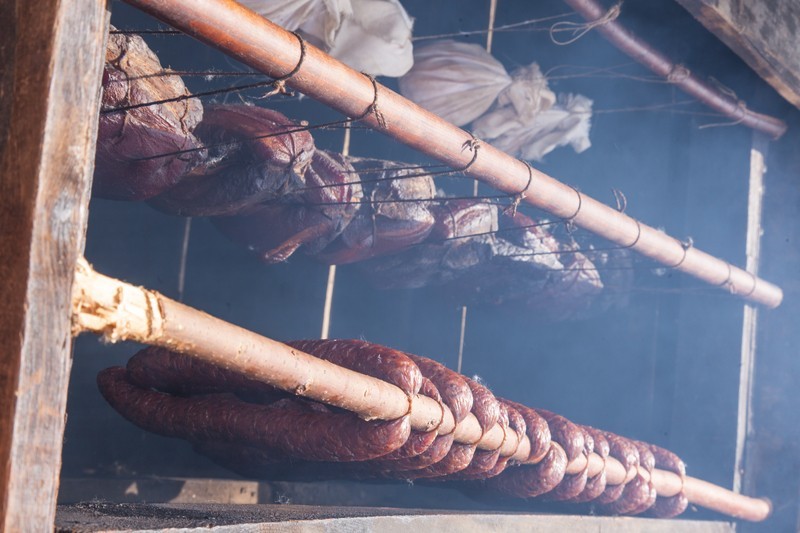There's a big challenge for people who have either sporadic electricity or are dealing with a survival moment because this means they're unable to preserve meat because they don't have any refrigeration.
Spoiled food and meat, in particular, is an issue we could all face considering the current shape of our national electrical grid. After all, in a sustained outage all of the meat in a freezer could spoil depending on whether you prepared for a collapse ahead of time.
Luckily refrigeration is a relatively new invention and back then before it was invented people knew of and utilized several different methods to preserve their meat so they could have access to it year round.
Whether you desire to maintain meat for an emergency or want to set up a system to preserve your food during an emergency, you can check out some excellent options after the break.

Rogue Specter
Do not murder the beings it belongs to .
Omg… get real, go post on another page if you are not into it.
Logan Peppard
hey$#%&!@*i love steak!!!!!
Sorry I did not know you were in charge . when do the pay checks come out .
I love human flesh so sweet . so I guess were both Ok
Drying – Nearly everyone is familiar with jerky or dried meat. Drying meat removes moisture that fosters bacterial and fungal growth. Meat is cut into thin slices to allow it to dry before it starts to spoil. While meat can be dried without any additives, it is generally soaked in a brine mix with salt and spices prior to drying. The salt draws more moisture out of the meat and also discourages spoilage organisms. Dried meat is highly nutritious and very lightweight which makes it a great provision for traveling. It can also be mixed with vegetables and water to make nourishing soup. Meat to be dried should be very lean as fat will not dry but rather go rancid. Dried beef, especially if it has been spiced, will last 6 months or so, but it never hangs around that long at my house.
Salting – Salting is a very old way to preserve meat. Meat is cut into chunks and layered in a barrel with salt. Each piece is completely surrounded by salt. Salting pulls the moisture out of the meat and produces an environment that doesn’t allow for bacterial growth. Meat that has been properly salted becomes very hard and must be soaked in several batches of water to rinse the salt out of the meat before it can be prepared for a meal. Salted meat is generally used for stews and soups. Salted meat will last at least six months, although it may have to be repacked as the salt absorbs moisture from the meat and becomes brine. However; the longer the meat is in the salt, the more work it takes to make it edible.
Curing and Cold Smoking – Curing and cold smoking are the traditional ways to preserve fatty meats such as ham, bacon, and pastrami. Curing is the process of soaking the meat in a strong brine of salt and spices. The brine is often injected into larger pieces of meat to speed up the process. This not only flavors the meat, but draws out moisture and prevents the growth of spoilage organisms. Curing for preservation requires a stronger brine than those generally used with store purchased meat which are intended for flavor only not preservation. Once the brining process is complete, the meat is cold smoked to seal the surface as well as to add flavor. Cold smoked meat must not be heated beyond 110 degrees or the meat will start to cook and its keeping qualities will be compromised. Once the process of curing and cold smoking is complete, it can be wrapped in brown paper and stored in a cool dry place such as a cellar or basement. Do not try this with store purchased hams and bacon as they were not cured in a way intended for preservation and will quickly spoil. Cured and smoked meat can last up to 6 months, depending on the storage temperature.
Thanks for those details very concise and understandable
Rachel Atkinson Dudley
If salted correctly it can last for many years not just months. There are several people who have tested this and some even cultures that salted meat have talked about how long they have preserved it.
Anyone ever tried canning meat? I know my grandparents used to do it. I just don’t know what exactly needs to be done to do it or if it will last any longer then smoking
I can meat all the time. Get yourself a Ball Blue book and join some canning groups on Facebook. Lots of info out there. You’ll be a pro in no time. You can even find good pressure canners and jars at yard sales or swap and shop sites.
Actually that’s how I got started was getting stuff from garage sales so I could can all the extra veggies from the garden. I just didn’t know if there was anything special for meat. I can always find a book on how I was wondering if anyone knew how long it actually keeps compared to smoking
I’m still using canned chicken breast from 3 years ago. I know the “official rules” are to use within 1 year, but I don’t necessarily follow all of the rules.
Kris Blegen Hess Anything canned is safe to eat until the seal gives up on the lid. It may discolor, but if the seal is good, the food is safe.
William Reeder
I agree but the canning police would probably disagree.
Bob Peisley
Jessica Farris
Smoke it